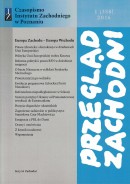Referendum niepodległościowe w Szkocji jako klęska i triumf Szkockiej Partii Narodowej
Scottish independence referendum as a defeat and triumph of the Scottish National Party
Author(s): Tomasz CzapiewskiSubject(s): Politics / Political Sciences, Politics
Published by: Instytut Zachodni im. Zygmunta Wojciechowskiego
Keywords: independence referendum; regional party; Scotland; United Kingdom; General Election
Summary/Abstract: This article aims to explain the seemingly paradoxical process of the strengthening of the Scottish National Party in the period immediately after the Scottish independence referendum in 2014. The main reasons are the processes of polarization and consolidation of the SNP and unionist parties around the binary choice - yes or no to independence. The most important circumstances contributing to the phenomenon include: growing aversion to the institutions of British democracy; crisis of the Scottish Labour Party in terms of organization, personnel and program; popularity of the new leader and the effective change of leadership within the SNP, as well as far-reaching effects of the Unionists' campaign referred to as "Project Fear". Additionally, we can also mention: surge in civic activism as a result of the referendum campaign, a more favorable attitude of the media, austerity policies of the Tory government in London, country-level crisis of the Liberal Democrats and tactical considerations: a widespread expectation of a House of Commons without a one-party majority and the territorial distribution of electoral support for the SNP - beneficial in the context of a majoritarian system. 2015 is the year when the political momentum in Scotland changed, and it clearly favoured SNP and supporters of independence. The results of the independence referendum were only for a short time widely regarded as conclusive for decades. When making predictions one should remember that Scottish possibilities of independence are determined not only by factors such as national identity and constitutional disputes, but also by assessment of the functioning of political parties and public policies, and increasingly by the international context (United Kingdom European Union membership referendum).
Journal: Przegląd Zachodni
- Issue Year: 358/2016
- Issue No: 01
- Page Range: 117-132
- Page Count: 16
- Language: English, Polish

